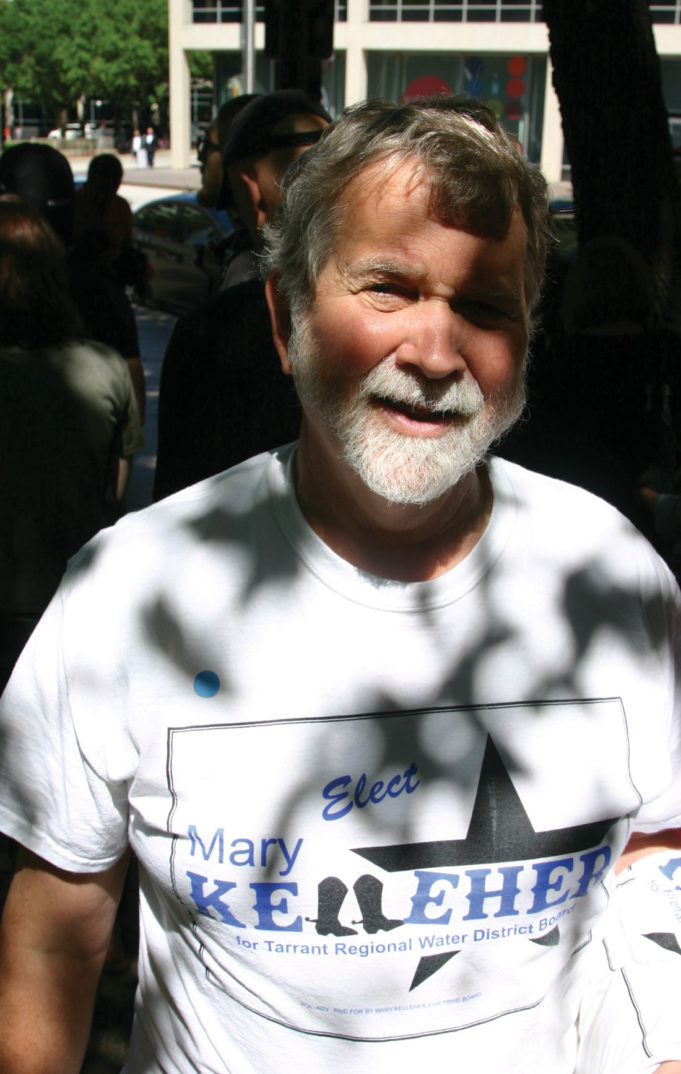The colors blue and red don’t surface much in local elections such as this Saturday’s to determine the makeup of the Fort Worth City Council, the Fort Worth school board, and the Tarrant Regional Water District. Those nonpartisan races don’t require candidates to claim a political party, although a candidate’s affiliations are telling in a country divided deeply between conservative and liberal ideals.
Clearly, Mayor Betsy Price, whom Donald Trump referred to as a “fantastic friend,” leans to the right. The truth rarely passes through the president’s teeth, so who knows what he really thinks, but he’s made it clear that a conservative mayor from a large conservative-leaning city is somebody he wants on his side. Most major urban areas in the country vote blue as the sky.
Last year, Price supported Trump’s ridiculous idea to host a military parade in Washington, D.C., (that never happened) and spoke against joining in a lawsuit with every other major Texas city challenging a state law designed to reign in sanctuary cities. Price was urged to run for mayor in 2011 by U.S. Sen. Kay Granger, the Republican kingpin –– queenpin? –– of the Panther Island flood control-turned-economic development project that hasn’t really gone anywhere and might end up a tremendous boondoggle. Voters have re-elected Price three times. Name recognition counts for a lot, especially in local elections. Fewer than 10 percent of registered voters bother to cast ballots in these elections. The lower the vote counts, the easier, in theory, it would be for challengers to rally their troops and pull off an upset.
Price likes to say potholes don’t care if you’re Democrat or Republican. She’s no typical conservative – she promotes biking and public transportation and supports measures to tackle climate change.
Still, she’s nowhere in the sphere of challenger Deborah Peoples when it comes to leaning left. Peoples is the chair of the Tarrant County Democratic Party and quick to point out that, with herself at the helm, the party was able to secure a county-wide victory for Beto O’Rourke over incumbent Ted Cruz in their 2018 senate battle.
“We wore out shoe leather getting the word out and turning Tarrant blue,” Peoples told us. “And my team and I are doing the same for this election.”
Price looks strong but is facing a legitimate challenger in Peoples, who said she is not running against Price so much as running for Fort Worth. City leaders under Price’s watch have put too much strain on homeowners and apartment dwellers, Peoples said.
“Those people are paying the price for the huge tax breaks she’s given corporations to get them to move to Fort Worth,” Peoples continued. “She has been mayor for eight years and recently said on an interview we did together that residents might see a reduction of city services. But residents are paying more taxes than they ever had, so that’s not acceptable.”
And despite Price’s pro-public transportation talk, Peoples is frustrated at the lack of improvement in city transportation.
“Great cities have great transportation systems,” Peoples said. “Bike lanes are wonderful, but they don’t always get people to work.”
Price told us she will continue to be the same boots-on-the-ground leader she has been for the last eight years. She’s running on a strong history, having initiated and pushed nearly a dozen important programs, including literacy and health initiatives, and helping grow Fort Worth while maintaining much of the city’s small-town charm. She has said she would concentrate on continued business growth and childhood education if re-elected.
The race also includes declared write-in candidate Mike Haynes and James H. McBride, who lists his occupation as “server” and whose campaign contribution report shows he has spent $18 on his campaign in addition to his $100 filing fee.
In city council races, both District 2’s Carlos Flores and District 9’s Ann Zadeh are running unopposed. Councilmembers in districts 3, 4, and 7 are being challenged but appear likely to maintain their seats. Rumblings for change appear to be coming primarily from districts 5, 6, and 8.
In District 5, incumbent Gyna Bivens is facing a field of four challengers. Initially elected in 2013, Bivens has pushed efforts to renew the Cavile Place neighborhood with mixed-income housing and retail, backs a civilian review board for police, and wants more funds committed to public transportation. The Fort Worth Star-Telegram listed her “impressive command of the community” as its reason for endorsing her.
Bivens’ challengers, however, say she has fallen short in several areas. Waymond Patrick Brown Sr. said not nearly enough attention has been paid to District 5’s crumbling sidewalks and streets or to education that “includes social skills and financial literacy.” Tammy Pierce vows to “go to companies to get them to come into the community to provide those jobs in the southern sector of the city, and then I’ll work for public transportation to allow the people in this district to get to those jobs.” Bob Willoughby said voters should replace Bivens because she is out of touch with her constituents. Thomas B. Brown said eastern Fort Worth has “great potential that is largely untapped and … often ignored by the city and goes with little to no representation.”
In District 6, the longest serving councilmember, Jungus Jordan, must have been surprised when the Star-Telegram endorsed Daryl Davis II, a pastor who has worked for the community at the Presbyterian Night Shelter and the YMCA. Davis said, if elected, he would “bring back leadership, accountability, and responsiveness to the residents,” along with more public transportation.
In District 8, four-term council member Kelly Allen Gray might have been shocked similarly after the Star-T endorsed Chris Nettles. The court clerk and pastor has passion –– he ran a strong race for mayor in 2017 –– and boundless energy. The AFL-CIO endorsed Nettles as well. He backs the creation of a civilian review board, reducing tax breaks on corporations, and pushing for more state and federal funding for city projects. Also seeking election is Kevin “KL” Johnson, who has worked with community leaders on resolving teen violence, homelessness, and economic change.
“We need a voice in the street, not a politician in the seat,” Johnson said.
Gray cited the “positive work we’ve seen these past few years I’ve been in office,” such as improvements in economic development, quality affordable housing choices, city services, and neighborhood participation in a community.
The elected officials with the most power and persuasion over the Panther Island project serve on the board of the Tarrant Regional Water District. Two at-large seats have drawn five candidates –– two longtime incumbents (Jim Lane and Marty Leonard), two first-time seekers (Gary Moates and Charles “CB” Team), and a fiery former board member who wants another four-year term after being voted out in 2017 (Mary Kelleher).
At stake is the leadership of one of the most powerful government agencies in North Texas. The water district serves more than 2 million people with raw water in 11 counties and oversees the $1.1 billion-and-rising Panther Island project that has languished in recent years amid funding shortages and questionable supervision.
Voters who like how Panther Island is progressing might want to keep the incumbents. Residents concerned with the water district’s general lack of transparency and arrogance at being questioned over details of its operations might want to look elsewhere. We like Kelleher.
Of the four school board openings, District 2 looks like the most consequential. Little is particularly influential about the district, which includes Eastern Hills and Polytechnic high schools. What matters here is the potential for restructuring the school board’s balance of power as incumbent Tobi Jackson seeks reelection against her opponent, former Eastern Hills High School principal Chad McCarty.
Jackson is one of the most experienced candidates –– and to many, the most qualified on paper –– on the school board. Voters elected her in 2010, and she has worked to improve the district’s on-time attendance, graduation rates, and performance ratings at the city’s most struggling schools. However, she rescinded the school board ethics policy nearly two years ago, creating a public uproar that prompted the school board to draft and pass its current ethics policy.
McCarty is a political newcomer and private business owner. Improving student outcomes and school board transparency are two of his two main issues. However, he has raised concerns about his views on transgender students and homosexuality after voting affirmatively on eight of nine questions posed to him as part of a Bible litmus test conducted by Gateway Church’s VoteUnderGod.com poll.
McCarty is currently working with political consultant Travis Parmer, who has consulted for current board member Ashley Paz, a vocal critic of Jackson. Paz could benefit politically from a shakeup that involved ousting Jackson. McCarty said he knows Paz and bumps into her often but wasn’t encouraged by her to seek office and harbors no designs at creating a voter bloc or shift in power.
As for how his religious beliefs and thoughts on the LGBT community might impact his role as a board member, McCarty said his personal beliefs don’t persuade his thoughts on educating kids.
“If you ask me a yes/no question about marriage and gender, you’re going to get a yes/no answer,” he said. “I don’t break policy, and I don’t allow bullying. I’ve hired [Muslims]. I’ve had staff members invite me to their same-sex wedding, and they got a wedding gift from me. My wife and I have an agreement, a partnership of love. We decided that this is how we will raise our family, but we will not disrespect anyone else’s family.”
District 3 is saying farewell to Christene Moss, who has served on the school board for nearly 30 years. Seeking to fill her spot is barber Cleveland Harris, whose background is in neighborhood association leadership. He is blasting the lack of equitable resources among the districts. Adjunct professor Quinton Phillips has served on several city volunteer boards and believes adult role models can improve student achievement.
District 5’s board position is being vacated by Judy Needham, who has served since 1996. Attorney and political newcomer Carin Evans will face off against Carla Morton, a physician who unsuccessfully ran for a seat on the Texas State Board of Education last year.
District 6 has a three-way race among Anne Darr, Lisa Saucedo, and Sandra Shelton. Darr emphasizes her educational consulting experiences. Saucedo has served on multiple PTAs. Shelton touts the importance of literacy for young students.
Statewide municipal elections are Saturday, May 4. Visit fortworthtexas.gov for more info.












